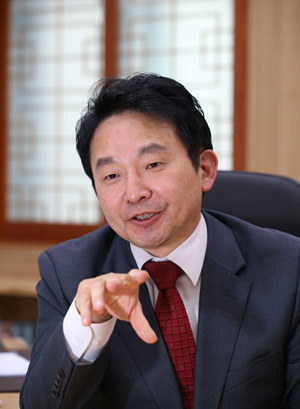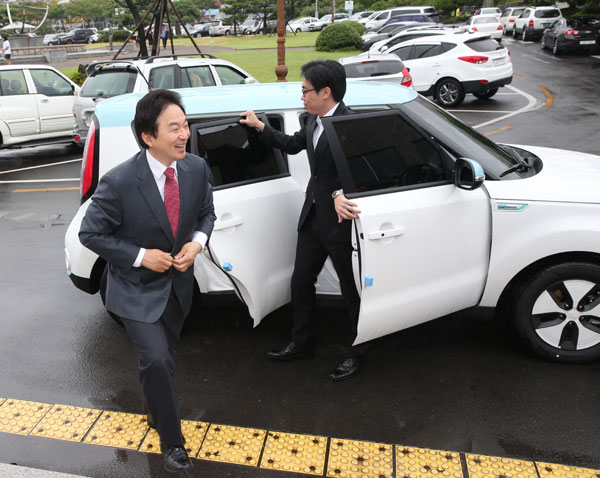Ideal site for Fourth Revolution

Question: Jeju's Government is moving ahead with a “Carbon Free Initiative by 2030," an initiative designed to turn Jeju new into the world's first carbon-free island. Could you elaborate on this initiative?
Answer: Jeju aims to make the island carbon-free by 2030 through electric cars and developing offshore wind-power plants. This initiative refers to a Green Big Bang strategy that pushes the fusions of the smart grid, the storage and use of new and renewable energy, Internet of things and access to information. Under the carbon-free island policy, all vehicles running on the island will be replaced by electric cars by 2030. The 4.3GW of electricity consumed by Jeju Province will be also repalced by solar and hydropower.
The Green Big Bang strategy calls for creation of a smart energy ecosystem, among other things. Toward this purpose, the Jeju Special Self-Governing Government has developed a host of Low-Carbon and Green Growth projects including a smart grid demonstration site, a model electric car distribution center, land and hydropower development sites and Gapado project, all in partnerships with the Central Government Jeju is also pushing for other numerous projects that can generate new earnings for residents with solar energy farming in old orange fields. In addition to the transport and energy sectors, Jeju will work for the goal of creating an eco-friendly and smart city with collaborations of ICT, smart technology, AI and Interne of things, with all industrial sectors like housing, plants, roads and transport networks.
Jeju’s Green Big Bang strategy is one of Korea’s major new energy policies which has attracted attention from the Paris Climate Change Conference and the Davos Forum. The strategy is recognized as a model new energy policy that can be applied to 2,400 cities around the world. Of note, Gapado Island’s “Micro-Grid” pilot project is becoming a new model energy policy for a number of countries like Indonesia, the Philippines, UAE and Canada.
Gapado now relies mainly on solar and wind power for electricity. Two wind power generators have been installed on the island, which produce 500kw of electricity. More than half of the houses on the island have solar generators installed. Making Gapado Island carbon free is the first of three phases in the Carbon Free Island Jeju Initiative By 2030.
Q: Could you talk about the future of electric vehicles on Jeju Island?
A: We are the first in Korea to promote the introduction of electric cars. While both domestic automakers and local governments had been less positive about the advantages of electric cars, we have pushed ahead with the project with firm conviction. Jeju plans to convert all the 370,000 vehicles including taxes, rental cars and cargo trucks, as well as small passenger cars by 2030. We intend to actively promote EV-related industrial sectors. This will enable related enterprises to advance into Jeju and create many jobs. One of them is a battery recycling sector.
The batteries and energy storage systems, which will be vital to the massive supply
of electric vehicles and renewable energy, will become economically feasible and closely related to the development of smart cities. Jeju should take the lead in turning the battery recycling area, a Blue Ocean sector, into a future-oriented business. On June 13, 2017, Jeju held a seminar on the launch of a battery-cycling development center. The center is responsible for development of analysis apparatus for battery-recycling assessment and battery test systems. More than 15 CV-related industrial sectors including maintenance service, secondary CVs and dead batteries can be created on Jeuju Island with additions of over 200 jobs. We will push ahead with development of CV-related industrial sectors.

Q: What is Jeju’s vision of the Fourth Revoluion?
A: Jeju is an ideal site for achieving the Fourth Revolution. The natural environment, such as wind, solar, rains and waves of seas, is ideal for development of new and renewable energy. Jeju is taking the lead in the development of smart grid industries and the Energy Storage System (ESS) infrastructure. There were reports that the advent of the Fourth Revolution will deal a hard blow to the farming and fisheries sector and service industry. In order to address these challenges, we will remain focused on improving the standards of software related to AI, robots, self-driving cars, drones, and VR(vertical reality). These sectors will make significant contributions to creation of new jobs on the island.
The Fourth Revolution will be spearheaded by those who are inquisitive and open-minded and have creative computing-minds. There are concerns that artificial intelligence, a core part of the Fourth Revolution, would result in slashing job opportunities and worsening the gap between the rich and the poor. We have to develop education programs to address the Digital Literacy, which is replacing the brains of humans, as well as their physical power. Jeju now conducts coding education in response to the Digital Literacy. For my part, I developed an app, which recommends tourist destinations and a shooting game by using the Scratch and App Inventor program. In addition to coding, Jeju’s Self-Directed Learning Center has developed a variety of programs
to cultivate future talent pool.
Q: What is the significance of the 12th Jeju Forum held on the island recently?
A: I believe that the Jeju Forum for Peace and Prosperity has consolidated its status as a forum for public diplomacy. A record number of 5,500 leaders from 81 countries participated in the two-day forum for discussions on global and regional issues. Leaders remarked that ecology and climate change, along with war and violence, are closely connected to peace. They called for advancing the “peace industry” through production and use of peaceful energy like wind power and electric cars.
I held discussions with leading participants from a host of countries. Al Gore, former Vice President of the United States, remarked Jeju’s energy vision could become the driving force of the future in coping with climate change. I; also talked about how to advance democracy using digital technology in the Digital age with France’s Minister for Government Reform Jean Vincent Place. The Jeju Forum will hopefully develop more discussions on specific issues like inter-Korean cooperation through and collective security, peace and exchange through denuclearization of the Koran Peninsula. We will seek to turn the Jeju Forum into a “Peace Platform to identify and discuss future issues for common prosperity.
Q: What are major tasks facing Jeju Government?
A: We have made every effort to develop a model city for sustainable development for the past three years. Now is the time to reap the fruit of our labor. The urgent task is to improve the living standards of Jeju residents while seeking to remove the growing pains of Jeju’s rapid development. We need to be focused on improving the satisfaction of Jeju residents, alongside pursuing quantitative growth. In this regard, we are moving ahead with “Five Projects for Jeju Residents” which also include curbing real estate speculation, mass transit system improvements, and prevention of reckless land development without thought for the environment. Also included are qualitative tourism and development of electric cars and renewable energy.
Our Provincial Government will pursue “transparency” in implementing the housing site development policy. The public rental housing project will be implemented in ways which would help to revive the regional economy and add jobs. We will intensify the efforts to reduce the complaints of residents in garbage disposal. Above all, we will implement “solar energy farming” in old tangerine fields and development of cooperatives-type wind power.
Q: Could you go into details about Jeju’s new job creation plan?
A: Top priority is placed on improving job quality and nurturing a creative class of people. Jeju is plagued by small service establishments which hire mostly low-paid and contract workers. The public sector, in my view, should do something positive until the private sector is positioned to improve the employment situation. Public enterprises should add jobs by expanding their businesses. Jeju Development Corporation, for instance, intends to convert numerous contract workers to regular staffers, while increasing the number of its employees to 780, nearly double the present employees. This job expansion policy is having impacts on Korea Tourism Organization and Jeju Energy Corporation. Up to 80% of persons hired for large-scale investment projects on Jeju Island will be comprised of local workers. These new job regulations will be also applied to 24 foreign invested firms based on Jeju. Moreover, we will go to explore Smart Tourism and Smart Farms by utilizing the Fourth Industrial Revolution. We will also go all out to cultivate digital professionals by way of coding education, big data collection, and creation of innovative platform centers. We aim to increase the personal capital of Jeju residents by sharing the income of large companies and small regional firms and partnerships between energy enterprises. A Jeju Job Creation Committee was inaugurated in March 2017 in order to facilitate our job creation and quality management efforts. The committee will come up with ideas for job creations for the private sector as well as the public sector and measures to improve the treatment of contract workers of private firms. It will serve as a window to recommend ideas and a platform for employment improvement.
Q: What is your vision of Jeju’s future?
A: My governing philosophy focuses on cleanliness and coexistence. We aim to build a future in which the nature and human coexist. Jeju will lose all if it is deprived of its clean nature. That’s the reason that we took measures to prevent land reckless land development. We are pushing growth with our cleanliness well preserved. I have issued no single permit for real estate investment by foreigners since I took office. I will pursue this policy in regard to land development.
We are seeking to build a new airport and a seaport in view of Jeju’s long-term interests. These projects will be pushed with top priority placed on preservation of Jeju’s distinctive natural resource, such as Mt. Halla. A set of dramatic measures will be taken to preserve the ecological environment of mountains and other areas. Introduction of a seaside greenbelt system is also under consideration. We are also studying the possibility of creating a new national park for the environment asset around Mt. Halla. We are endeavoring to develop future-oriented businesses such as future energy sources, biotechnology, cutting-edged Fourth Industrial sectors, education and health care.

